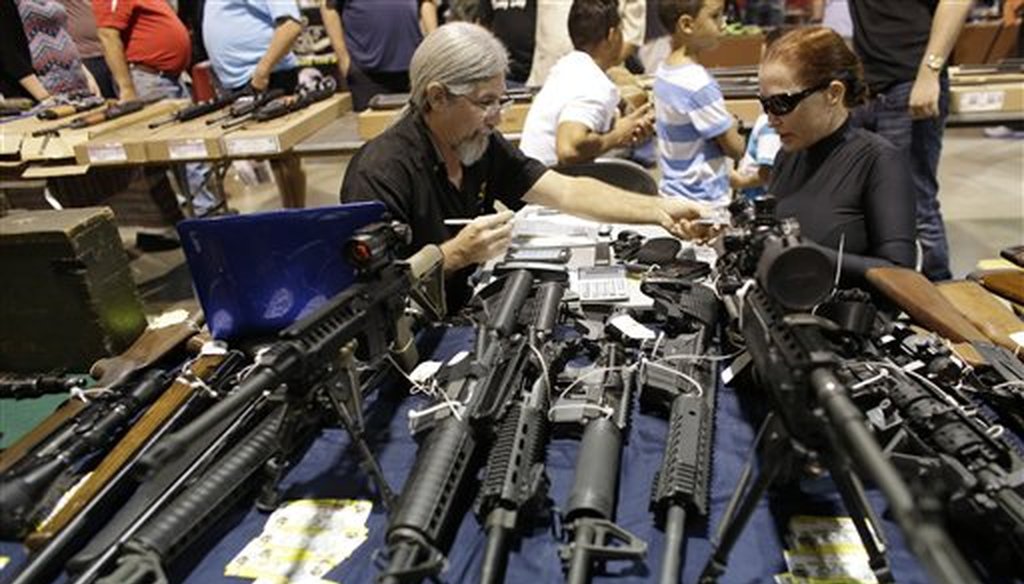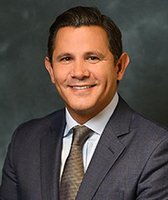Stand up for the facts!
Our only agenda is to publish the truth so you can be an informed participant in democracy.
We need your help.
I would like to contribute

Harvey Kornnfield, owner of Airport Pawn, left, works on a sale with Bamula Schlesinger, right, at a gun show hosted by Florida Gun Shows, Saturday, Jan. 9, 2016, in Miami. Schlesinger purchased an Uzi and a Smith & Wesson 38. (AP)
The same morning Sen. Chris Murphy, D-Conn., renewed his call on the Senate floor for expanding gun background checks, there was yet another mass school shooting.
This time, the Nov. 14 shooting was at Saugus High School in Santa Clarita, Calif., near Los Angeles. The shooter, who killed two students and injured three others, fatally shot himself.
And again, politicians and advocates debated whether to expand gun background checks.
Many Democrats running for president have called for new laws to make background checks universal. President Donald Trump has spoken in favor of stronger background checks immediately following mass shootings, only to amend his position later.
The battle over whether to tighten background check laws raises a key question: have background checks proven effective?
We’ve fact-checked the claim that background checks have been unequivocally shown to reduce gun violence. We rated it Half True.
We found that while background checks are associated with reduced gun violence, there’s no firm evidence they solely reduce violence separate from a broader system of laws.
Why is that? It’s complicated, but there are multiple reasons, including that background checks don’t apply to all types of firearm transfers; some gun owners obtain guns illegally; there are shortcomings in the background checks system; and it’s difficult for researchers to pluck out the impact of one type of law.
Under federal law, federally licensed gun dealers, importers and manufacturers must run background checks for sales to an unlicensed buyer. The law bans firearm transfers to people who were convicted of serious crimes or committed to a mental institution.
But private sellers without a federal license don’t have to meet the same requirement. Though this exception is often referred to as the "gun show loophole," it actually applies more broadly to unlicensed individuals, whether they are selling at a gun show or to friends and relatives.
Gun control advocates want the exceptions ended. "In order for background checks to fully work we need to ensure that all guns are required to go through background check at the point of purchase," said T. Christian Heyne, Vice President of Policy at Brady Campaign to Prevent Gun VIolence.
A 2017 report from the U.S. Justice Department found that nearly 197 million applications for firearm transfers or permits have been run through the National Instant Criminal Background Check System, which is operated by the Federal Bureau of Investigation. Of those checks run between 1994 and 2015, more than 3 million applications — 1.5% -- were denied, many due to criminal convictions.
It’s possible to find research that suggests background checks are at least somewhat effective in reducing gun violence — and possible to find research that suggests little or no impact.
Researchers at the University of California at Berkeley and San Francisco as well as Johns Hopkins found the Connecticut law requiring background checks was associated with a 40% reduction in gun homicides between 1996 and 2005. The reduction amounted to 296 lives.
They determined this by comparing Connecticut’s homicide rates after the law went into effect to rates that would have been expected if the law had never passed. Researchers used comparison data from other 39 states that did not have a similar law.
Earlier research from Johns Hopkins found that Missouri’s 2007 repeal of its handgun license law was associated with about a 23% increase in its firearm homicide rates.
Many states have enacted universal background check policies that go beyond federal law. Some states have "permit to purchase" rules in which states issue permits to purchase firearms after people apply to a state or local law enforcement agency, pass a background check; and, in some states, show evidence of firearm safety training.
Garen J. Wintemute, who directs the University of California Davis Violence Prevention Research Program, recently summarized the research and found that some studies showed new state laws did reduce the risk of subsequent violence among people whose purchases are denied.
However, Wintemute wrote, the results of other studies have been mixed. A Georgetown study in the 1990s following the Brady Act found no reductions in homicide rates or overall suicide rates.
Meta-analyses have examined the conclusions of various studies about background checks.
A 2017 analysis by researchers at Harvard and Texas Children’s Hospital examined peer-reviewed articles from 1970 to 2016 focusing on the association between firearm laws, including background checks, and firearm homicide in the United States.
One of the authors, Harvard professor David Hemenway, told us that "evidence is strong that stronger gun laws overall are protective, but it has been difficult to know which particular ones are most effective."
Hemenway said whether a particular law is effective is difficult to determine for multiple reasons including:
-
Scholars don’t have good models of why suicide and homicide change over time.
-
Many interventions have small overall effects and often have varying effects over time, and scholars haven’t modeled those varying effects over time well (e.g., background checks have little effect on the existing gun stock).
-
Scholars typically lack individual-level data such as whose guns were used in the event, how long did the individual perpetrator possessed the firearm, or whether the shooter could have passed a background check. "Studies thus are unable to disaggregate the expected effects, or look at the chain of causality."
One reason background checks may not be as effective as some advocates had hoped for is that many criminals use guns that they obtained illegally or received from friends or family, and therefore they didn’t undergo a background check.
In 2018, Trump signed a federal spending bill that included language to strengthen the National Instant Criminal Background Check System, or NICS. Experts said that NICS was flawed and that some mass shooters have been able to obtain guns despite records that should have prevented them from purchasing them.
The legislation uses incentives and punishments in an effort to encourage agencies load up records to the system. While the legislation passed with bipartisan support, Democrats said it was a small step and didn’t erase the need for universal background checks.
In February, the Democratic-led House passed a law to require background checks for firearm transfers between private parties. The bill has not had a vote in the GOP-led Senate.
Trump has not shown interest recently in pursuing an expansion of background checks, making vague statements when pressed by reporters about it. We asked the White House for comment and did not get a response.
Our Sources
Congress.gov, HR 8, 2019
Giffords Law Center, Universal Background Checks, Accessed Nov. 4, 2019
White House, Remarks by President Trump and President Moon of the Republic of Korea Before Bilateral Meeting | New York, NY, Sept. 23, 2019
U.S. Department of Justice Bureau of Justice Statistics, Background Checks for Firearm Transfers, 2015 - Statistical Tables, November 2017
University of California at Berkeley and San Francisco and Johns Hopkins, "Association between Connecticut’s permit-to-purchase handgun law and homicides," April 6, 2015
Journal of Urban Health, Effects of the Repeal of Missouri’s Handgun Purchaser Licensing Law on Homicides, March 2014
Johns Hopkins Center for Gun Policy and Research press release, "Connecticut Handgun Licensing Law Associated With 40 Percent Drop in Gun Homicides," June 11, 2015
Journal of the American Medical Association, Firearm Laws and Firearm Homicides: A Systematic Review. 2017
Health Affairs, Background Checks For Firearm Purchases: Problem Areas And Recommendations To Improve Effectiveness, October 2019
The Late Show with Stephen Colbert, Interview with Rep. Nancy Pelosi, Nov. 1, 2019
Washington Post, Trump abandons proposing ideas to curb gun violence after saying he would following mass shootings, Nov. 1, 2019
Washington Post, Why Senate Democrats are considering holding up a gun-control bill from one of their own, Feb. 28, 2019
The Trace, What We Know About the Effectiveness of Universal Gun Background Checks, Sept. 11, 2019
Factcheck.org, The Gun Debate, March 5, 2018
National Rifle Association, Background Checks for Guns, Jan. 7, 2019
ABC News, Here's where the 2020 Democrats stand on gun control, Oct. 15, 2019
Health Affairs, Background Checks For Firearm Purchases: Problem Areas And Recommendations To Improve Effectiveness, October 2019
Everytown for Gun Safety, Background checks reduce gun violence and save lives, January 2017
Everytown for Gun Safety, Background Checks Save Lives and Protect Our Communities, Jan. 8, 2019
Sen. Chris Murphy, D-Conn., Tweet, Nov. 14, 2019
PolitiFact, Donald Trump’s shifts on gun background checks after mass shootings, Aug. 23, 2019
PolitiFact, Donald Trump says he's done more than other presidents to solve the gun problem. Has he? Aug. 8, 2019
PolitiFact, What percentage of gun sales are done without a background check? March 16, 2018
PolitiFact, Have background checks been ‘unequivocally’ shown to reduce gun violence? Oct. 11, 2017
PolitiFact, Donald Trump fully flip-flops, lately opposes ban on assault weapons, April 12, 2016
PolitiFact, PolitiFact Sheet: 3 things to know about the 'gun show loophole' Jan. 17, 2016
PolitiFact, Fact-checking a misleading post on ID requirements for buying guns, voting, Feb. 22, 2018
Email interview, Liam Sullivan, Brady Campaign to Prevent Gun Violence spokesman, Nov. 5, 2019
Email interview, Daniel Webster, Director, Johns Hopkins Center for Gun Policy and Research, Nov. 6, 2019
Telephone interview, T. Christian Heyne, Vice President of Policy at Brady Campaign to Prevent Gun Violence, Nov. 6, 2019
Email interview, David Hemenway, Harvard professor of public health Nov. 14, 2019
































